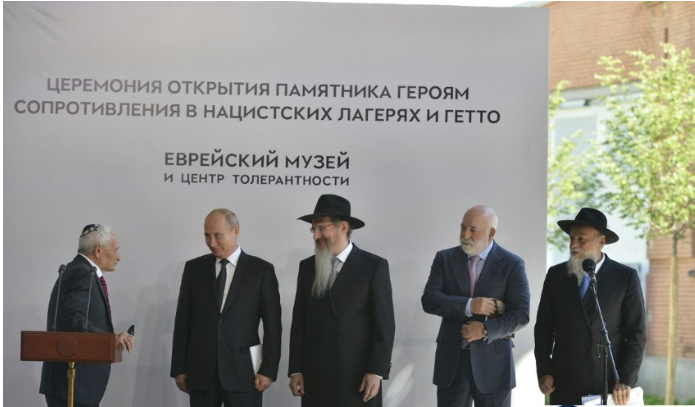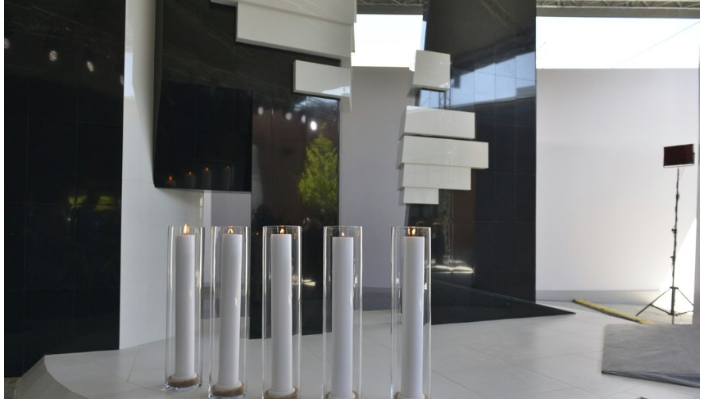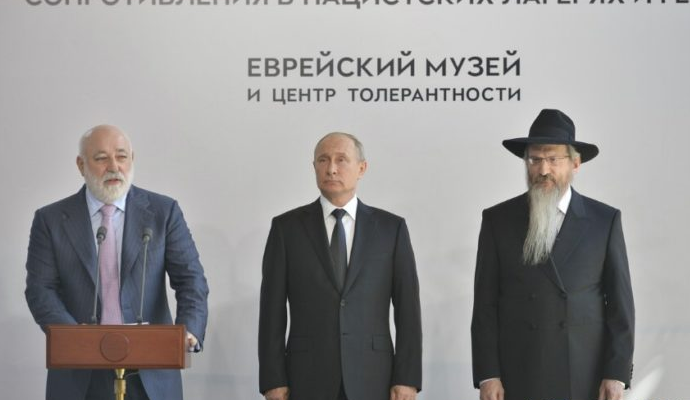Russian President, Vladimir Putin, attended the unveiling ceremony for a new memorial dedicated to the heroes of the resistance movement in concentration camps and ghettos during World War II. The memorial is housed in the Jewish Museum and Tolerance Center. Museum Trustee Board Chairman Viktor Vekselberg, Russia’s Chief Rabbi Berel Lazar, President of the Federation of Jewish Communities Alexander Boroda and took part in the event together with Aron Bielski, the youngest of the four Bielski brothers.
Both President Putin and Israeli Prime Minister Binyamin Netanyahu participated in the laying of the monument’s foundation stone on the International Holocaust Day a year ago.
“We are gathered here today in order to unveil the memorial dedicated to the resistance fighters in concentration camps and ghettos. I am delighted to be here with you on this special day. Memorials are a great thing – we certainly need them. But the most important thing is to keep the memory of this past alive in our hearts. Only that can save us from re-living the tragedies we are remembering here today. What happened to the Jewish people is, no doubt, one of the greatest tragedies and, at the same time, one of the most extraordinary chapters in the history not only of the Jews, but of humankind, as a whole,” President Putin announced at the unveiling ceremony. He added that owing to the fortitude and the true grit displayed by the prisoners, as well as their desire to resist at all costs, “the death machine which the Nazis thought to be perfectly tuned and totally invulnerable” was shattered.
The tender for the architectural composition was timed for the 75th anniversary of the uprising in the Sobibor Nazi death camp. A total of 98 applications from architects, sculptors, and artists from across Russia were submitted in the bid to design the commissioned memorial. The victory in the contest went to an architect from Saratov, Oleg Fandeyev. The monument is an abstract composition of black and white marble, which depicts hands pulling open a door’s shutters. Five glass flasks with candles are installed at the monument. The composition also integrates an interactive screen with a map and information on the uprisings in concentration camps and ghettoes.
Chair of the Board of Trustees of the Jewish Museum and Tolerance Center, Viktor Vekselberg, told the reporters that the unveiling of the memorial became an important milestone for him personally, as well.
“The unveiling of the new memorial is both symbolic and watershed. For me personally, it is a very special milestone, since all my relatives from the father’s side – I’m not really sure what would be the right word to use here – “lived” in a ghetto in a small town, where I was born and went to school. Later, the Nazi invaders razed this ghetto to the ground. There were more than 10 thousand people who were bussed out into the woods, executed there, and buried together in mass graves,” Vekselberg intimated, adding that 16 members of his own family died there. “Only my father managed to survive, because he had fled earlier to join the militia and later fought in the ranks,” he said. Vekselberg added that this chapter in his family’s history is impossible to forget saying, “there is no way one could ever wipe out this memory.”
“A people that forgets its own past has no future. That is why the memorial we are unveiling today in the museum is an important symbol of the enduring painful wound and the awesome memory, a reminder to all of us living today that we must do all we can to never let something like this happen to us again. Today, we see terrifying examples of monuments being torn down and history being fudged and rewritten. Despite all that, we will continue to build, remember, cherish, and honor,” Vekselberg said in his remarks.
The project was sponsored by Chairman of the Renova Group Board of Directors and Chairman of the Museum’s Trustee Board Viktor Vekselberg. The monument’s construction cost over 18 million rubles ($276,000).



Source: Yeshiva World News






